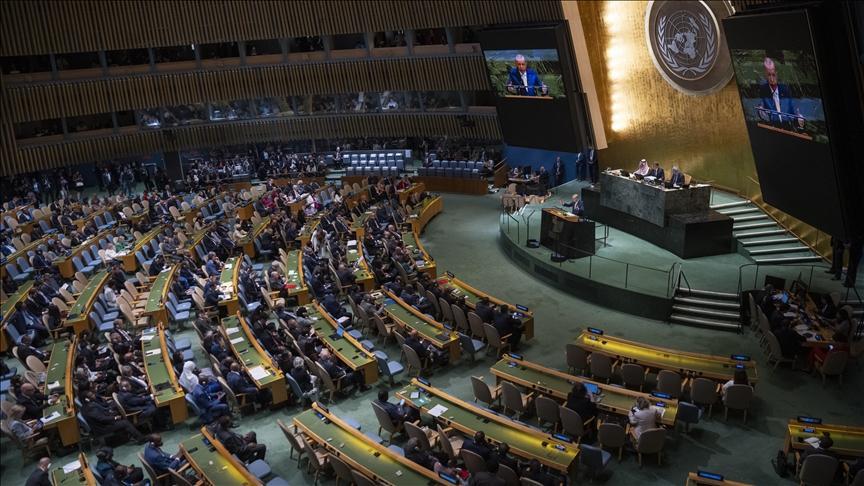Africa-Press – Eritrea. A Palestine conference, spearheaded by France and Saudi Arabia, brought together international leaders to discuss solutions to the Gaza crisis and the implementation of a two-state solution.
Several European leaders announced their countries’ recognition of Palestine during a high-level meeting on the sidelines of the UN General Assembly in New York on Monday, describing the move as a historic step toward ending the Gaza war and advancing a two-state solution.
The France- and Saudi Arabia-led international conference, formally titled the High-Level International Conference for the Peaceful Settlement of the Question of Palestine and the Implementation of the Two-State Solution, brought together international leaders who urged immediate steps to end the war in Gaza and advance a peaceful resolution to the Israeli-Palestinian conflict.
Europe
Addressing the conference, Spain’s Prime Minister Pedro Sanchez said, “We have to stop this slaughter now,” as bombs continue to fall “indiscriminately on the civilian population in Gaza.” He warned that “there is no solution possible when the population of one of those two states is the victim of a genocide.”
Sanchez called for Palestine to be admitted as a full UN member state “as soon as possible” and said Spain will move forward with measures to halt the brutality in Gaza.
“History will judge us, and its verdict will be brutal with those who perpetrated this slaughter and with those who remained silent or turned a blind eye,” he added.
Ireland’s Prime Minister Michael Martin echoed the urgency, saying: “The only viable option to deliver a peaceful future for Israel and for Palestine is a two-state solution.”
Describing the suffering of Palestinians in Gaza as “an affront to the world,” he said: “We have reached a point where what has been credibly described as a genocide is being carried out in front of the eyes of the world.”
Ireland recognized Palestine last year alongside Spain, Norway, and Slovenia.
Luxembourg’s Prime Minister Luc Frieden also formally declared his country’s recognition of Palestine, calling it “the beginning of a renewed commitment” to hope, diplomacy, and coexistence. He stressed that the decision is not “against Israel or its people” but aimed at reviving the prospect of peace based on international law and the UN Charter.
Malta’s Prime Minister Robert Abela also confirmed his country’s recognition of Palestine, saying: “What is happening in Gaza is morally and legally very wrong, and we have a duty on all of us to act.”
Andorran Foreign Minister Imma Tor Faus described the situation in Gaza as “unbearable,” pointing to hunger “used as a weapon of war” and mass forced displacement. Calling for an immediate ceasefire, she said the government of Andorra has approved the recognition of Palestine, stressing that Palestinians “should live in peace and security within their own state, side by side with the state of Israel.”
Belgian Prime Minister Bart De Wever reaffirmed his country’s support for a two-state solution, joining the signatories of the New York Declaration.
He emphasized, however, that Belgium’s formal recognition would take place only once all hostages are released and Hamas is no longer part of Palestinian governance.
European Commission President Ursula von der Leyen welcomed the momentum, noting that “the state of Palestine has been recognized by the majority of EU member states.”
While the majority of European countries now recognize a Palestinian state, two of the continent’s largest economies, Germany and Italy, have signaled they are unlikely to make such a move soon.
Germany’s Foreign Minister Johann David Wadephul acknowledged that a two-state solution “appears more distant than ever” but insisted there is “no convincing alternative” to “an independent, democratic, and viable Palestinian state existing side by side and in peace and in security with Israel.”
Italy’s Foreign Minister Antonio Tajani expressed his country’s support for a two-state solution and highlighted Rome’s humanitarian assistance to Palestinians but stopped short of announcing recognition.
Slovenia’s Foreign Minister Tanja Fajon said Gaza is experiencing “what international law defines as genocide,” pointing to images of children dying in the enclave, which has been under an assault by Israel and a humanitarian crisis marked by starvation.
“The horrifying images of starving children in Gaza are the outcome of deliberate choices; this is a manmade catastrophe,” said Fajon.
Denmark, Netherlands to ‘recognize the State of Palestine under certain conditions’
Danish Foreign Minister Lars Lokke Rasmussen and Dutch Foreign Minister David van Weel said their countries will recognize the state of Palestine under certain conditions.
Van Weel underlined the need to end the “horrific war” in the Gaza Strip and reverse the troubling trajectory in the occupied West Bank.
Van Weel said a legitimate and democratic Palestinian authority with full control over its territories is vital for the establishment of a viable Palestinian state, adding that Hamas should not have any role in the future Palestinian administration, and demanded the release of hostages and the disarmament of the resistance group, stressing that any potential solution must “guarantee Israel’s security.”
“The Netherlands will recognize the state of Palestine at a later stage, as part of the political process that needs to begin now,” said van Weel.
Rasmussen, asserting that the war in Gaza has resulted in a “humanitarian catastrophe on an unbearable scale” and that “Tel Aviv is expanding its military operations,” urged Tel Aviv to end it immediately and change course.
“The key to recognition of the State of Palestine should no longer lie in the hands of the Israeli government,” he said. “The key” must be in the Palestinians’ hands.
“Denmark is ready to recognize Palestine as a state once certain conditions are met: when Israeli hostages are released; when Hamas is disarmed and no longer plays a role in Gaza,” he said.
When more progress is made on the Palestinian Authority’s reform agenda, and when there are guarantees that the future Palestinian state will be demilitarized, Denmark will recognize the State of Palestine, he added.
Arab Countries
Arab leaders and senior officials voiced support for a two-state solution, demanding an end to Israel’s war in the Gaza Strip and urging countries that have not yet recognized Palestine to do so.
Speaking on behalf of Egyptian President Abdel Fattah al-Sisi, Prime Minister Mostafa Madbouly said: “There will be no stability in the Middle East without a just and comprehensive solution that fulfills the legitimate aspirations of the Palestinian people to establish their independent state on the June 4, 1967 lines with East Jerusalem as its capital.”
Al-Sisi stated on the US social media company X: “The recognition of the independent State of Palestine and its realization on the ground is not a dream, but rather a steadfast determination to uphold a right for which the Palestinian people have long struggled, supported by all peoples of the world who aspire to peace.”
Jordan’s King Abdullah II told the conference that “the war in Gaza must end, humanitarian aid must flow unhindered, and all illegal and unilateral measures in the West Bank must also end.”
He stressed that the two-state solution is “the only path to the just and lasting peace that fulfills the rights of all our peoples.”
Qatari Minister of State for Foreign Affairs Sultan Al-Muraikhi said the world must recognize the dual context: decades of injustice against Palestinians and a current deterioration marked by Gaza’s destruction and Israeli violence in the West Bank.
He condemned the “irresponsible Israeli escalation” that also targeted Qatar on Sept. 9, holding Israel responsible for a violation of international law.
United Arab Emirates Minister of State for Foreign Affairs Khalifa Shaheen Al Marar welcomed the wave of international recognition of Palestine, urging more states to act.
“Given the grave developments in Gaza and repeated Israeli threats of annexing the West Bank, efforts must continue to achieve a ceasefire and support the mediation of Egypt, Qatar, and the US,” he said, renewing calls for the UN Security Council to step in.
Algerian Foreign Minister Ahmed Attaf declared: “The time has come for concrete action to realize the state of Palestine and to confront diplomatically, legally, and economically Israel’s plans to displace Palestinians from their historic land.”
Arab League Secretary-General Ahmed Aboul Gheit also urged protection for Palestinians against “systematic Israeli killings” and safeguarding the Palestinian project from “vindictive punitive measures that threaten its future prospects.”
Brazil
Brazilian President Luiz Inacio Lula da Silva condemned Israel’s ongoing assault on the Gaza Strip, saying it amounts to an effort to “exterminate the Palestinian people.”
“The conflict between Israel and Palestine is the paramount symbol of the obstacles faced by multilateralism,” Lula said, warning that “the tyranny of the veto sabotages the very reason for the UN’s existence of avoiding atrocities like the ones that motivated its founding from happening again.”
Stressing that the pillars of statehood have been systematically undermined in the Palestinian case, he said: “A state is based on three pillars: territory, population, and government, all of which have been systematically undermined in the Palestinian case.”
“How can we talk about territory in the face of an illegal occupation that grows with each new settlement? How do you keep a population in the face of the ethnic cleansing we are witnessing in real time?”
Pointing to the dire situation in Gaza, Lula declared: “There is no more appropriate word to describe what is happening in Gaza than ‘genocide.’”
“What is happening in Gaza is not only the extermination of the Palestinian people, but an attempt to annihilate their dream of a nation. Both Israel and Palestine have the right to exist,” he said, while praising countries that have recognized Palestine, as Brazil did in 2010.
Japan
Japan warned Israel of “new measures and a response” if Tel Aviv blocks a path to the realization of a two-state solution in Palestine.
“Japan fully supports the aspirations of the Palestinian people to establish their own independent state,” Foreign Minister Takeshi Iwaya said, adding: “Should Israel take further actions that block the path to the realization of a two-state solution, Japan will be compelled to introduce new measures and a response.”
While carefully monitoring developments in the region, Iwaya told the conference, “Japan will continue its comprehensive deliberations with even greater seriousness.”
“Above all, what matters most is that Palestine can exist in a sustainable manner, living side by side in peace with Israel,” he said. “Japan will continue to play a realistic and proactive role in advancing towards the goal of a two-state solution, even by a single step.”
While recalling “tangible contributions” made by Japan, viz-a-viz developments and reconstruction in the West Bank, Iwaya said: “The situation has reached a grave and alarming juncture that threatens the very foundation of a two-state solution.”
“The sharp deterioration of the humanitarian crisis in Gaza, the expansion of settlement activities in the West Bank, and the step towards annexation are completely unacceptable,” he said. “Japan strongly condemns these actions and calls on Israel to immediately cease all such unilateral measures.”
For More News And Analysis About Eritrea Follow Africa-Press







